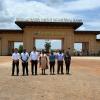NSPSD II Pillars
MESO Pillar: Accelerating Industrialisation to Drive Structural Transformation
The Meso Pillar is designed to catalyze industrialization by improving the performance and competitiveness of Uganda’s industrial sectors, particularly manufacturing and agro-processing. Recognizing the low productivity and underutilization of installed capacity in many industries, this pillar targets investment in infrastructure, energy, technology, and skills development to drive sector growth.
Uganda's industrial sector has remained underperforming, contributing only about 25.5% to GDP, with the manufacturing subsector stagnant at 15%. The Meso Pillar aims to reverse this trend through interventions that unlock bottlenecks like high electricity costs, limited access to long-term finance, and inadequate industrial infrastructure. Targeted support to Special Economic Zones (SEZs), the Uganda Development Bank (UDB), and industrial parks are being ramped up to stimulate production and attract investors.
Agro-processing remains a core focus, given Uganda's strong agricultural base. The Strategy promotes increased value addition in key commodities like dairy, coffee, tea, fish, beef, and maize. Most of these sub-sectors are currently operating at below 66% capacity, mainly due to poor infrastructure, low quality inputs, and unreliable power. Through this pillar, government is working with private actors to improve access to technology, streamline standards, and link value chains for scale and export readiness.
To improve industrial productivity, the government also emphasizes technical and vocational education reforms, including private sector involvement in curriculum design and apprenticeships. Strengthening BTVET institutions is key to bridging the skills gap that hinders manufacturing and processing industries.
By targeting systemic industrial constraints and fostering linkages across value chains, the Meso Pillar seeks to drive economic transformation, create decent jobs, and increase Uganda’s share in regional and global markets.
MICRO Pillar: Supporting Enterprise Profitability, Competitiveness and Growth
The Micro Pillar is dedicated to enhancing the viability and growth of enterprises, particularly Micro, Small and Medium Enterprises (MSMEs). Uganda’s private sector is dominated by MSMEs, which represent 98.8% of all businesses and provide over 2.5 million jobs. However, high informality, limited access to finance, and low survival rates remain critical obstacles.
This pillar aims to transition informal businesses into the formal economy by simplifying registration procedures and providing access to support services such as Business Development Services (BDS), training, and affordable credit. Platforms like the Taxpayer Registration Expansion Programme (TREP) and OBRS are being leveraged to incentivize compliance while ensuring ease of entry into the formal system.
Financial inclusion is a core tenet of this pillar. Government is promoting credit guarantee schemes, tailored financial products, and mobile-enabled digital finance to reach underserved MSMEs, especially women and youth-led businesses. Equally, enterprise development programs are being embedded in government financing windows such as UDB, EMYOOGA, and the Parish Development Model.
Through this pillar, the government seeks to ensure that no entrepreneur is left behind, by enabling sustainable enterprise development.


